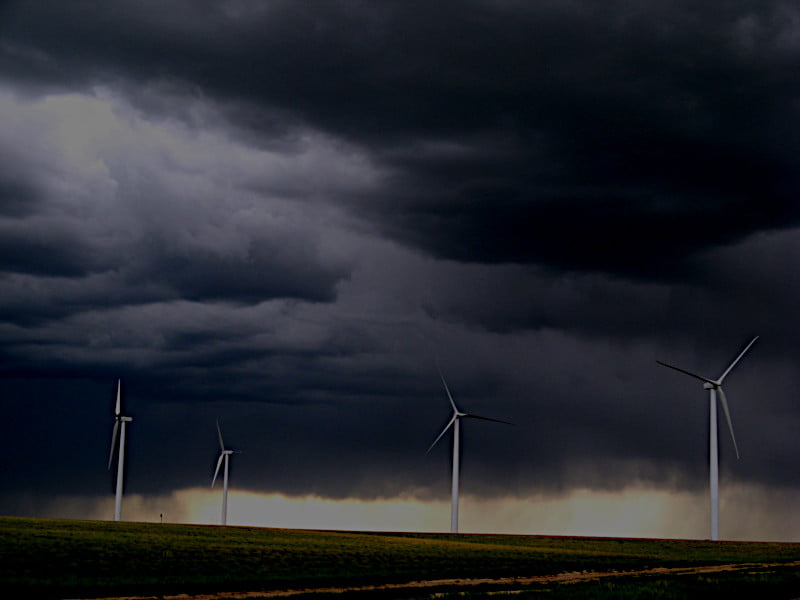This article has been reprinted with permission from the original author, Robert Bryce, as well as permission from National Review. It originally appeared in National Review on May 2nd, 2017.
 The world’s biggest wind-energy company has filed lawsuits against five rural governments because they stand between it and millions in tax subsidies.
The world’s biggest wind-energy company has filed lawsuits against five rural governments because they stand between it and millions in tax subsidies.
NextEra Energy, which bills itself on its website as “the world’s largest generator of renewable energy,” is suing a tiny municipality in one of Oklahoma’s poorest counties.
In mid February, NextEra, which operates 110 wind projects in 20 states, filed lawsuits in both state and federal court against the town of Hinton, population: 3,200. Why is the wind giant suing the Caddo County town? Simple: Hinton stands between NextEra and nearly $18 million per year in federal tax subsidies.
NextEra isn’t suing only Hinton. Since last October, the wind giant has filed lawsuits against five rural governments from Oklahoma to Michigan, all of which have imposed limits on wind-turbine development. The company has also filed a libel suit against Esther Wrightman, a Canadian activist who opposed a project NextEra wanted to build in Kerwood, Ontario. Wrightman’s offense? She called the company “NexTerror” and “NextError” on her website, ontario-wind-resistance.org. That libel suit, filed four years ago, is still pending.
To be certain, the oil and gas industry has filed lawsuits against local governments that have sought limits on hydraulic fracturing. The difference is that NextEra is using taxpayers’ money to fund its courthouse mugging of small-town America. Between 2008 and 2015, according to a recent report by the Institute on Taxation and Economic Policy, NextEra accumulated profits of $21.5 billion but didn’t pay a dime in federal income taxes. Over that time frame, only ten other American companies received more in tax subsidies than NextEra. Nor does it appear that NextEra will be paying federal taxes any time soon. In its 10-K filing for 2016 with the Securities and Exchange Commission, the company reported $3 billion in tax-credit carryforwards that it can use to directly offset tax liabilities in future years. Remember, tax credits are more valuable than a deduction from revenue or accelerated depreciation. As my accounting consultant (and brother) Wally Bryce, a CPA, reminds me: “You’d much rather get a tax credit because it applies dollar for dollar against what you owe the government.”
NextEra wants more tax credits. And it’s litigating to get more. But each lawsuit NextEra files against a yet-smaller rural town or yet-smaller website owner provides another example of the backlash against Big Wind and, even more appalling, how Big Wind is using the issue of climate change as an excuse to make a run on the Treasury. Since 2015, more than 130 government entities in states from Maine to California have moved to reject or restrict the encroachment of the wind industry. And while other wind companies have also sued small towns, none can match NextEra’s scorched-earth tactics.
On January 17, Hinton town officials passed an ordinance that calls wind turbines “a public nuisance” and prohibits their installation within two miles of the town’s borders. In a recent phone interview, Hinton’s mayor, Shelly Newton, told me that she and other town officials met with NextEra representatives last year and that the company agreed to the two-mile restricted area. When the town officials asked NextEra to put the agreement in writing, the company refused. A month after the town passed the ordinance, the company filed its lawsuits.
“We were trying to give ourselves some elbow room,” said Newton, whose ancestors settled in Oklahoma more than a century ago. Hinton is the second-largest town in Caddo County, where the average annual per capita income is about $17,800. For per capita income, Caddo ranks 69th among Oklahoma’s 77 counties. Nationally, Caddo ranks near the bottom 10 percent of all U.S. counties in per capita income.
Last October, NextEra filed a state lawsuit against officials in Clinton County, Mo., shortly after the county passed a ban on wind turbines. In January, NextEra filed suit in Indiana state court after officials in Rush County denied a permit for a 22-turbine project the company wants to build.
In Canadian court, NextEra still hasn’t dismissed its 2013 libel suit against Wrightman even though they beat her: After a bitter fight, NextEra got the permits it needed to build the 60-megawatt Adelaide wind project. After losing the fight over the Adelaide facility, Wrightman and her family decamped for Saint Andrews, New Brunswick. In a recent e-mail, she told me that her only significant asset is the family business, Wrightman Alpines Nursery, which she inherited from her recently deceased father, Harvey. NextEra’s libel lawsuit “makes me so friggin’ mad,” she added, “… the power they have with their game of legal warfare.”
While other wind companies have also sued small towns, none can match NextEra’s scorched-earth tactics.
The latest to be sued by NextEra: Ellington Township, Mich. On March 31, NextEra sued the township (population: 1,200) in federal court. That lawsuit came about six weeks after the wind-energy giant filed a federal suit against Almer Township, Mich., population: 3,100. The two townships are fighting a 118-megawatt NextEra project that would put more than four dozen 500-foot-high wind turbines on roughly 10,000 acres in Tuscola County; the facility would cover about 15 square miles.
NextEra’s litigation against the two townships is the latest example of the backlash against Big Wind in rural Michigan, a backlash that has been raging for years. Today, Almer Township will vote on a referendum on NextEra’s project. In addition, nearly 20 other rural townships in Michigan will vote on wind-related ballot initiatives today.
I recently spoke to Russell Speirs, the newly elected town supervisor in Ellington, Mich. He took office in November after sweeping out the incumbent supervisor, who’d been in office for two decades, by a 3-to-1 margin. “The township board had lost connection to the people it was representing,” Speirs told me. Four of the five seats on the new board were filled by people opposed to NextEra’s project, and they quickly passed a moratorium on new wind installations. Speirs says the town will fight NextEra. “We are not going to be intimidated, and we are not going to back down.”
Mike Pattullo is among the leaders of the opposition to NextEra’s proposed wind project in Ellington. In November, Pattullo’s wife, Carmell Pattullo, was elected to be the township’s new treasurer. The Pattullos are part of a loosely organized group called Ellington-Almer Township Concerned Citizens. The group has a Facebook page and has raised some cash to fight NextEra. “We’ve spent about $20,000, and not a penny of it has come from outside this community,” Mike Pattullo told me. When I asked him if NextEra had been straightforward with the township about its project, he quickly replied, “Absolutely not — I don’t think they’ve been truthful with us at all.”
Since the November election, Pattullo and his family (including his 77-year-old mother) have been subjected to repeated verbal abuse by Dave Vollmar, a landowner who has leased his property to NextEra for the proposed wind project. Vollmar’s obscenity-laden screeds have been documented on video and are examples of how, in Pattullo’s view, the conflict over NextEra’s wind project is ripping “the township to shreds.”
If wind energy is as green and clean as 350.org, the Sierra Club, and the Natural Resources Defense Council keep telling us, why is the world’s biggest wind-energy company trying to sue rural governments and activists into submission?
NextEra’s litigation against Hinton, Ellington, Wrightman, and others raises an obvious question: If wind energy is as green and clean as 350.org, the Sierra Club, and the Natural Resources Defense Council keep telling us, why is the world’s biggest wind-energy company trying to sue rural governments and activists into submission?
Then again, perhaps NextEra doesn’t need to worry about its image. On February 16, the company issued a press release bragging that it ranked first among electric and gas utilities on Fortune magazine’s 2017 list of the world’s most-admired companies. The release said it marks the “10th time in the past 11 years that NextEra” has been “voted the top company in its industry.”
Indeed, not paying taxes and suing wind-energy opponents appears to be excellent for business. Since 2013, when NextEra sued Wrightman, the company’s market capitalization has nearly doubled. It now stands at about $62 billion.
